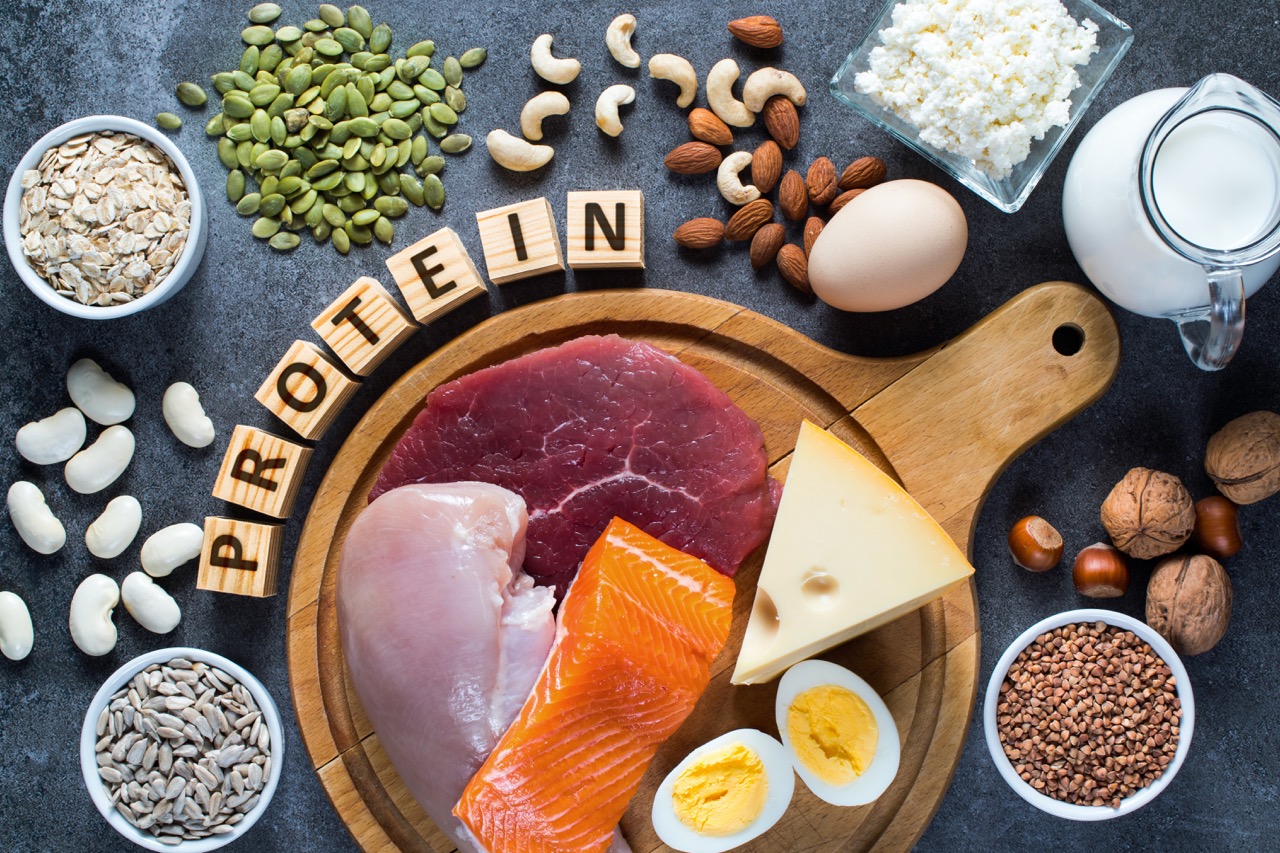Everything changes when you become a parent.
If you hadn’t thought much about nutrition before, becoming a parent may have piqued your interest. Especially when this tiny human starts to show strong preferences for the foods they want to eat. You’ll start to ask yourself questions like, “What am I going to send for lunch?” or “Why is my child rejecting this food?” or “Is my kid getting enough protein?”
On that last one, protein is a nutrient that gets a lot of attention in the nutrition world. Parents often come to us as Registered Dietitians with concerns about their child’s protein intake. In this article, we’ll be answering your top questions about protein and kids!

Question: How do I know if my child is getting enough protein?
The good news, your child is likely getting plenty of protein. On average, toddlers need 13 g each day, while school aged children (4 to 8 years old) need an average of 19 g each day. These recommendations are based on body weight. Smaller children will require less, while larger children will need more. If you’re curious to know how much your child needs each day, simply multiply their weight in pounds by 0.5 to arrive at an approximate amount of grams required.
To put things into perspective, if a child consumed two cups of milk (16 g protein), one egg (6.5 g protein), ½ cup of pasta (4 g protein), ¼ cup rotisserie chicken (8.5 g protein) and a cheese string (6 g protein), they’ve eaten more than 40 g of protein, which is more than double the baseline needs for a school-ager.
Bottom line: While parents often wonder if their child is getting enough protein, this is usually a moot point. As Registered Dietitians, the following are questions we feel are more important to consider:
Q: Is my child getting enough high-quality protein?
Before we dive into what determines the quality of a protein, we need to back it up a bit and explain exactly what proteins are. Proteins are fairly complex structures that are composed of smaller building blocks, called amino acids. Certain amino acids are considered essential to the body. If you don’t eat them, your body can’t make all the proteins it needs to function optimally.
Each protein has a unique composition of amino acids. Some proteins score higher on quality indexes because they more closely match the ideal types and amounts of amino acids our bodies typically use. Additionally, proteins get scored on their bioavailability, which is a science-y way of describing how easily the body is able to digest and utilize the proteins.
Typically, proteins from animal sources, such as eggs, meat and dairy, score higher than plant-based proteins. Since humans are more closely related biologically to animals than plants, this makes sense. You can theoretically meet your essential amino acid needs by eating a variety of plant-based proteins but it can be tricky, especially if you have a child who is a picky eater.
Fun fact: Eggs have the highest quality protein of all proteins and are known as the gold standard.
Q: Do I need to offer a source of protein at breakfast?
You’ve probably heard the saying, “Breakfast is the most important meal of the day” and there is a grain of truth to this, but all eating opportunities are important—especially for growing children.
Something we’ve come to learn is that having enough protein in the morning can help people feel full over the course of the day. Protein is one of the nutrients that promotes satiety—the feeling of fullness. Meaning, if you skip out on protein at breakfast, don’t be surprised if your child is hungrier into the evening, close to bedtime, or constantly asking for snacks.
That was a roundabout way of saying, YES! You definitely want to offer your child a source of protein at breakfast. Options like scrambled eggs, nut butter or a glass of milk helps to set them up for their day.
Q: Should I give my child protein powder?
If you’ve read through the previous questions, you may already guess the answer. Since it’s not difficult to meet protein needs with food alone, protein powder isn’t needed for the majority of kiddos.
Additionally, many of the protein powders on the market include ingredients to boost athletic performance or the body’s ability to build muscle. These ingredients are not tested for safety in kids.
In some medical cases, there may be an indication for including a protein power supplement but this should be done under guidance and care of a health professional.
Q: What are some good sources of protein for kids?
There are lots of tasty and nutritious foods that contain plenty of protein. Do your best to offer an array of these foods to support your child’s optimal growth and development:
- Eggs
- Dairy
- Pulses, like beans and lentils
- Meat
- Seafood
- Soy, such as tofu or edamame
- Nuts and seeds
- Whole grains
Remember though, not all sources of protein are created equal. Eggs, in particular, are unique because they boast all nine essential amino acids. Many other sources of protein, in particular plant-based proteins, do not contain all essential amino acids.
Q: My child is very picky about food. Are you sure they’re getting enough protein?
Picky eating is something a lot of parents struggle with, which often brings up concerns about their child’s nutrition. If you’re in this phase of parenting, know you’re not alone.
In a Canadian Community Health Survey, it was reported that 96 percent of children age 1 to 8 consumed protein amounts that fell within the recommended ranges. This is reassuring!
Of course, in some cases, if a child is really struggling with food and nutrition, or if they have a medical condition that requires higher needs, they may not be getting enough protein. In this case it’s always best to speak to your doctor or a Registered Dietitian.
Q: Is there such a thing as too much protein?
As we like to say, too much of anything is never a good idea and yes, this includes protein. If children are consuming a very high excess of protein, it can cause unnecessary and potentially irreversible damage to their kidneys—the organ in our body that filtrates our blood.
Rest assured, if your child is consuming whole foods within balanced meals and snacks, this is unlikely and something as dietitians (and moms) we don’t want you to be worried about.
And there you have it! We’ve answered the top questions we get about protein. Armed with this information, we hope you feel better equipped to continue to serve balanced meals (even if you think you might need to make a few tweaks). Hopefully, you’ll also feel a little more relaxed about this particular arena of parenting.

One more thing: There’s a really good chance that if you’re reading this article, you’re doing an amazing job at this parenting thing. Be proud of yourself!

Jessica Penner, BSc, Registered Dietitian
Nita Sharda, BSc, Registered Dietitian
Combined, Jess and Nita have four children and over 28 years of experience working as registered dietitians. Their mission is to help parents feed from a place of love, trust and confidence so they can raise happy, healthy eaters. Visit happyhealthyeaters.com for more information.






